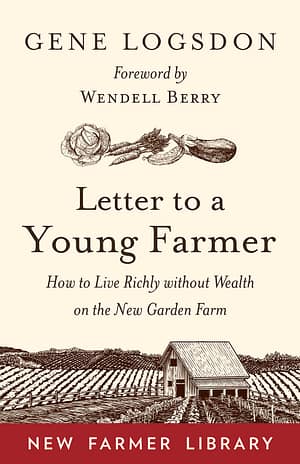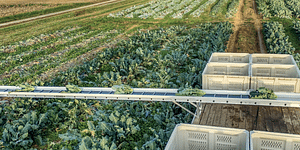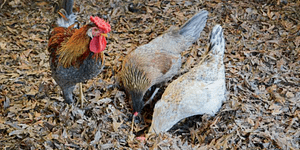New Age Farm Partnerships: Finding and Keeping One

Anything involving farming almost always requires the help of another person, whether you’re feeding the animals or trying to decide if you want to expand the barn. Partnerships not only help with your personal life but the success of your business in the long run as well. Having someone to share the work and ease the mental stress of running a farm can add a level of steadiness to an ever-changing or lonely lifestyle.
The following is an excerpt from Letter to a Young Farmer by Gene Logsdon. It has been adapted for the web.
Most farmers like solitude in the sense that they are uneasy in crowds, but loneliness is no fun at all. The first lesson of this biological fact of life is that if you are a mad farmer as Wendell Berry describes in his poems, you need a mate or partner who shares your madness. Many farming ventures collapse because only the husband or the wife really likes living that way. Out of love, the other agrees to go along with the idea but eventually learns that he or she can’t stand uncomfortable and seemingly unrewarding physical work twelve or more hours a day doing something that is not at least partly his or her idea. His or her lack of interest ends in divorce or in a kind of sullen silence that is worse than separation.
It is not difficult to find contrarians if you are one of them. If you put two contrary farmer types in a convention hall crowded with people, it will take only a couple of hours for them to find each other. That’s how I first met writing farmer Mike Perry. We just hit it off before we knew much about each other. I think maybe contrary farmers give off some strange magnetism that other contrary farmers feel. Maybe they give off an odor that other contrarians can smell, like the way a raccoon can find the nicest, ripest ear of corn in a ten-acre field in less than an hour.
Getting along with a contrary farmer in marriage involves lots of reverse psychology. Let us say you, as the wife, would like to have a patch of wild black raspberries in the garden so you don’t have to thrash around in the woods to pick some. So you opine, where hubby can hear you but not speaking directly to him, that it would be really dumb to move some plants from the woods to the garden. No one has probably ever done that before, you add. Probably wouldn’t grow there anyway. If you are married to a contrary but loving farmer, you will be picking wild black raspberries from the garden in a year or so.
Hard physical work always seems easier with two people involved: “Many hands make light the task,” as the old saying puts it. When I am hoeing corn, it makes all the difference in the world when Carol’s hoeing toward me from the other end of the row. Instead of inching along growling about the damned flies and gnats, the damned hoe that needs sharpening, the damned sweat in my eyes, and the damned weeds that would have been easier to hoe out last week, I’m thinking, “Oh, great, I only have to do half the row.”
The other secret to happiness in spite of the unpleasantness of some jobs is to extend togetherness to all areas of work. Males, especially older ones, tend to expect “the missus” to help out with fieldwork, but husband is nowhere in sight when it comes to doing the laundry or the housecleaning. The Hubbards, mentioned in chapter 1, “No Such Thing as ‘The American Farmer’,” did everything the old manual way because they understood there was more economic freedom to be gained. That meant that Harlan helped Anna with the laundry, the housework, and laying by their food.
Shelling peas alone is boring, to say the least. Two people shelling and gabbling to each other or even just silently aware of the other’s presence, makes it a rather pleasant activity in an odd sort of way. At least you can do it sitting down in the shade. Or as Elsie Kline writes in her delightful column, “The Farm Home” in Farming magazine (Fall 2014 issue, page 46): “Growing up, and also with our own children now, we’d sit in a circle, capping strawberries, shelling peas, shucking and cleaning corn, snapping beans, peeling peaches and pears, singing and playing word games as we worked. What fun it was!”
Of course, if both partners lean toward contrariness, working together takes some getting used to. I am fast and sloppy; Carol is slow and neat. The way I stack wood drives her crazy, and invariably my stacks start to fall over in the second year of drying. The way she does it makes me think we will freeze to death before the wood gets stacked at all, but with her way it will stay stacked until eternity if not used before then. Solution: she stacks and I split. Even as slow as she is, she can keep up with my splitting.
To find a compatible mate these days, farmers are hitching up their computers and trotting off down the internet highway. Sometimes this method of courting is actually successful. More often it is not. The main reason why Joe or Mary can’t find a mate in their own neighborhood or community is the same reason they can’t find one electronically either. They are too contrary.

Online dating will soon be as acceptable as going to church socials to find prospective mates used to be. If you really believe that love and marriage go together like horse and carriage, you know that choosing a life partner is your most important decision in life. The internet can widen the playing field, as long as the players are aware of all the pitfalls involved. It certainly is no more risky than trying to find a mate in a bar, and nowadays that’s also a fairly common occurrence—and has as good a chance of turning out as successfully as finding a mate in church.
What bothers me about search for a farm partner on the internet, the pitches that websites make to advertise themselves. Some of the ads project grossly prejudicial and stereotypical views of the farmer—a simple-minded, “aw, shucks” character that I thought had vanished from the social scene years ago. If any other group—social, occupational, religious, or ethnic—were represented with such crass inaccuracy, there would be outcries heard around the world. But farmers, aw, shucks, they are used to that kind of prejudice. It is just so far-out wrong, we just, aw, shucks, shrug it off. And that kind of image-making unfortunately works both ways. In retaliation, some rural people respond by ridiculing “city slickers” just as ignorantly.
But the whole notion of hunting for a mate online is problematic. Am I supposed to believe that farmers are too cut off from mainstream society to meet possible mates and therefore need help? Or are they too busy farming to take part in social activities where they can meet people looking for love and marriage? Come on now. Is there almost anyone in this day and age so cut off from the mainstream that they can’t find someone to date? I don’t believe it, unless maybe if you live in the middle of the Sahara Desert, and even then I’d bet against it. I spent my wild youth in a seminary located out in the woods, studying for the celibate priesthood. You can’t get any more isolated than that, but believe me, there were still plenty of girls around if one had a mind in that direction. Sex has hardly ever been stymied by anything so easily out-maneuvered as isolation. If you can’t find a mate, your problem runs a whole lot deeper than where you live or what you do for a living. When I left the seminary, I went back to farming, milking a hundred cows in a very rural area. That’s hardly mainstream. But it often seemed to me there were girls peeking out from behind every crossroads stop sign in the county. And one is never so busy as not to find time to peek back. I know a divorced farm guy who has gone the internet route to courting, and between text-messaging and chatting on his cell phone and traveling around checking out prospective mates, he racks up more hours at home than he used to complain about when he was married.
When two contrary farmers from far apart do fall in love, the outcome is doubtful because one of them will have to move. If you marry someone from far away, you will spend a lot of time traveling and visiting your in-law family. This can become a real burden when a farm is involved. If you get past that hurdle, there comes a time when help is needed in caring for children or parents, or grandchildren and grandparents. Lucky above all are the parents whose children either remain close to home or return to the home grounds to live close by. If you are a farmer with your heart buried in your land, it is important to talk this over with a prospective mate. I was lucky again. When Carol and I decided to move back to farm country, we could have moved to her old stomping grounds in Kentucky, but she was kind enough to agree to settle on mine.
We have been married for over fifty years now, and I know for sure that the success of our marriage wasn’t because of the number of people we dated and analyzed beforehand to see if they met our lofty standards of perfection. Neither of us had done much dating before at all. I was so madly in love with her that I was unable to make any kind of rational, objective judgment about anything. I am asked sometimes what is the secret of a successful marriage. I haven’t the slightest idea, least of all anything a computer might have told me.
Recommended Reads
Recent Articles
Oxeye daisies are one of the most important plants for pollinators including beetles, ants, and moths that use oxeye daisies as a source of pollen and nectar. Instead of thinking about removing a plant like oxeye daisy, consider how you can improve the fertility and diversity of habitat resources in your home landscape, garden, or…
Read MoreSo you want to start reaping your harvest, but you’re not sure where to start? Learn how to break down the options of harvesting tools!
Read MoreWhat’s so great about oyster mushrooms? First, you can add them to the list of foods that can be grown indoors! They are tasty, easy to grow, multiply fast, and they love a variety of substrates, making oyster mushrooms the premium choice. The following is an excerpt from Fresh Food from Small Spaces by R. J.…
Read MoreEver heard the phrase, “always follow your nose?” As it turns out, this is a good rule of thumb when it comes to chicken manure. Composting chicken manure in deep litter helps build better chicken health, reduce labor, and retain most of the nutrients for your garden. The following is an excerpt from The Small-Scale Poultry…
Read More








